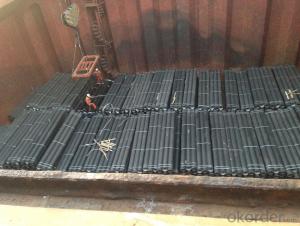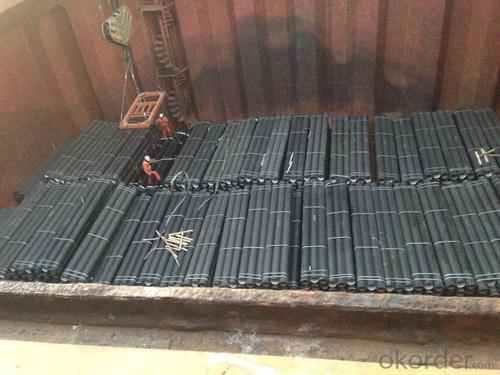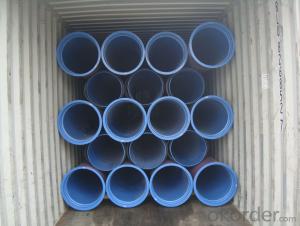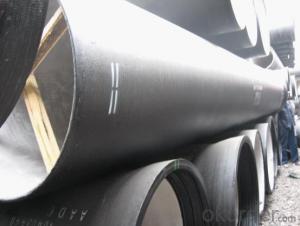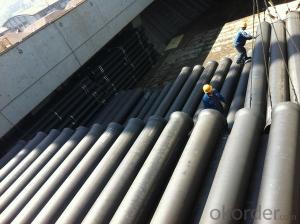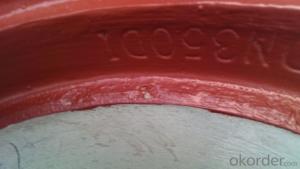T Type Ductile Iron Pipe K8 DN500 socket spigot pipe
- Loading Port:
- Tianjin
- Payment Terms:
- TT OR LC
- Min Order Qty:
- 25 m
- Supply Capability:
- 30000 m/month
OKorder Service Pledge
OKorder Financial Service
You Might Also Like
1) The standard of pipe: ISO2531:1998, EN545:2006,K9 K8
2) Effective length: 6m/5.7m
3) Inner cement line: Portland cement lineas per ISO4179
4) Zinc coating: at least 130g/m2 as per ISO8179
5) Bitumen painting: at least 70μm as per ISO8179
6)With 102% quantity of NBR, SBR, or EPDM ring asper ISO4633
7) DN80-DN1200
8) Highstrength, lighter than grey iron, good corrosion resistance, no furring, smallflow resistance, easy fixing, long life tome about 100 yeas
9)Checked by automatic inspection equipment
10) Composition:
Chemical composition | |||
Chemical composition | Ductile Cast Iron Pipe (%) | Grey iron pipe (%) | Steel pipe (%) |
C | 3.5-4.0 | 3.2-3.8 | 0.1-0.2 |
Si | 1.9-2.6 | 1.4-2.2 | 0.15-0.4 |
Mn | 0.15-0.45 | 0.4-0.6 | 0.3-0.6 |
P | ≤0.06 | ≤0.3 | 0.02-0.03 |
S | ≤0.02 | ≤0.1 | 0.02-0.03 |
Mg | 0.03-0.06 |
|
|
11) Feature:
Mechanical properties | |||
| Ductile Cast Iron Pipe | Grey Iron Pipe | Steel Pipe |
Tensile Strength(Mpa) | ≥420 | 150-260 | ≥400 |
Yield Strength(Mpa) | ≥300 | No Confirmation | No Confirmation |
Bending Strength(Mpa) | ≥590 | 200-360 | ≥400 |
Elongation (%) | ≥10 | Neglected | ≥18 |
Brinell Hardness(HBS) | ≤230 | ≤230 | About 140 |
12) T type mechanical joint
13) Packing: in bulk or container
PACKING: 1) Pipesare bundled together with the steel belt.
2) Wooden pieces are put between the pipes.
- Q: Can ductile iron pipe be used for industrial wastewater applications?
- Certainly, industrial wastewater applications can make use of ductile iron pipe. Renowned for its robustness, longevity, and corrosion resistance, ductile iron pipe proves itself suitable for a multitude of purposes, including wastewater systems. Its ability to withstand high pressure and endure demanding conditions renders it perfect for industrial wastewater applications that may involve abrasive or corrosive substances. Furthermore, the installation and maintenance of ductile iron pipe are effortless, resulting in reduced costs and guaranteed long-term dependability. Nevertheless, it remains crucial to carefully scrutinize the unique prerequisites of the wastewater application and seek guidance from professionals to ascertain the most fitting pipe material and design.
- Q: How are ductile iron pipes protected against interior corrosion?
- Ductile iron pipes are protected against interior corrosion through a process called cement-mortar lining. This involves applying a thick layer of cement mortar to the interior surface of the pipes, which acts as a protective barrier against corrosion caused by the flow of water or other substances. Additionally, corrosion-resistant coatings can also be applied to the pipes to provide further protection.
- Q: What are the different lining thickness options for ductile iron pipe?
- The specific application and project requirements typically dictate the various options for lining thickness in ductile iron pipes. Cement mortar lining, polyurethane lining, and polyethylene lining are among the most commonly used options. Cement mortar lining, which is widely employed in ductile iron pipes, involves the application of a layer of cement mortar on the inner surface of the pipe. This lining provides corrosion protection and enhances the hydraulic performance of the pipe. The thickness of cement mortar lining can vary from 3mm to 6mm. Polyurethane lining, another popular choice, is particularly suitable for applications requiring resistance to abrasion and chemical attack. It is usually applied using a spray or casting method, and the thickness can vary depending on project specifications. Typically, polyurethane linings range from 1mm to 4mm in thickness. Polyethylene lining, a relatively newer technology, is commonly used in applications where chemical corrosion resistance is crucial. The lining is applied using a rotational lining process, wherein a layer of molten polyethylene is evenly distributed on the internal surface of the pipe. The thickness of polyethylene lining can range from 2mm to 8mm, depending on project requirements. It is worth noting that the lining thickness can be tailored to meet specific project needs, including the corrosiveness of the transported fluid, operating conditions, and desired service life of the pipe. Consulting with a qualified engineer or pipe manufacturer is advisable to determine the most suitable lining thickness for a given application.
- Q: How do ductile iron pipes perform in high-altitude areas?
- Ductile iron pipes perform well in high-altitude areas due to their inherent strength and durability. The properties of ductile iron, including its high tensile strength and impact resistance, make it suitable for withstanding the challenges posed by high-altitude environments. One of the key advantages of ductile iron pipes is their ability to resist internal and external pressures. In high-altitude areas, where water pressure may vary significantly, ductile iron pipes can withstand the changes without compromising their structural integrity. This ensures the reliable and continuous flow of water without the risk of pipe failures or leaks. Ductile iron pipes also exhibit excellent resistance to corrosion, which is crucial in high-altitude areas where the atmospheric conditions can be more harsh and unpredictable. The pipes' protective lining and external coatings provide an additional layer of defense against corrosion, ensuring their longevity and reducing the need for frequent maintenance or replacements. Moreover, ductile iron pipes have a higher tolerance to temperature variations compared to other materials. In high-altitude areas, where temperature fluctuations can be extreme, these pipes can withstand the expansion and contraction without cracking or rupturing. This thermal stability is essential for maintaining the structural integrity of the pipeline system and preventing costly repairs. In summary, ductile iron pipes are well-suited for high-altitude areas due to their strength, durability, resistance to pressure variations, corrosion resistance, and thermal stability. These properties make them a reliable choice for water distribution systems in such environments, ensuring the continuous supply of water without compromising safety or efficiency.
- Q: Can ductile iron pipes be used for underground chemical processing systems?
- Due to their limited resistance to corrosion from various chemicals, ductile iron pipes are generally not recommended for use in underground chemical processing systems. Despite being known for their strength, durability, and flexibility, ductile iron pipes can still corrode when exposed to certain chemicals, especially those with high acidity or alkalinity. The use of ductile iron pipes in underground chemical processing systems poses a higher risk of exposure to corrosive substances that can gradually deteriorate the pipes. This deterioration can result in leaks, cracks, and failures in the piping system, compromising its integrity and potentially creating hazardous conditions. To mitigate this risk, it is advisable to consider alternative materials that offer greater resistance to corrosion in underground chemical processing systems. Stainless steel, PVC, and high-density polyethylene (HDPE) pipes are examples of materials that provide superior chemical resistance and can withstand the harsh conditions typically found in chemical processing environments. To determine the most suitable materials for underground chemical processing systems, it is essential to consult experts in chemical engineering, piping design, and corrosion resistance. The proper selection of materials is crucial for ensuring the longevity and safety of the piping infrastructure in such environments.
- Q: What are the different types of joints available for ductile iron pipe?
- Ductile iron pipes offer various types of joints, each with distinct advantages and suitability for different uses. Here are some of the most common joint options available: 1. Mechanical Joints: These joints create a watertight seal using a mechanical joint gland and rubber gasket. They are easy to install and allow for quick disassembly if needed. 2. Push-on Joints: This joint type involves compressing a rubber gasket when inserting the pipe into the fitting. It provides a reliable seal and requires no special tools for installation. 3. Restrained Joints: Designed to withstand higher internal pressures, restrained joints use a combination of mechanical or push-on joints along with additional restraints like thrust blocks or harnesses to prevent pipe separation. 4. Flanged Joints: Flanged joints connect two pipes using flanges and bolts. They are commonly used when frequent disassembly is required or when connecting to different types of pipes or equipment. 5. Welded Joints: In certain cases, ductile iron pipes can be welded together to create a strong and permanent connection. Welded joints are typically used in larger diameter pipes or specialized applications requiring high strength. When selecting the appropriate joint type for ductile iron pipes, it is essential to consider factors such as the pipe's application, pressure rating, and installation requirements.
- Q: Do ductile iron pipes require pressure testing before installation?
- Yes, ductile iron pipes do require pressure testing before installation. Pressure testing is a crucial step in ensuring the integrity and safety of the pipes. It helps to identify any leaks, weak spots, or defects in the pipes before they are put into service. Pressure testing involves subjecting the pipes to higher than normal operating pressures to check if they can withstand the expected pressure without any failure. This process helps to prevent potential issues such as leaks, bursts, or failures that could lead to water loss, property damage, or even accidents. Therefore, pressure testing is an essential requirement for ductile iron pipes to ensure their reliability and long-term performance.
- Q: Are ductile iron pipes suitable for use in wastewater treatment plants?
- Ductile iron pipes are indeed a suitable option for utilization in wastewater treatment plants. This is due to the fact that ductile iron possesses immense strength and durability, enabling it to endure the harsh and corrosive environment commonly found in such facilities. Furthermore, it boasts exceptional resistance against abrasion, corrosion, and chemical assaults, rendering it a dependable choice for the conveyance of wastewater and the handling of diverse chemicals and substances encountered in the treatment process. Another advantage of ductile iron pipes lies in their high tensile strength, allowing them to withstand both high-pressure conditions and the weight of the surrounding soil. Moreover, these pipes are renowned for their flexibility, affording them protection against ground movement and settlement, thus ensuring long-lasting performance and dependability within wastewater treatment plants.
- Q: What is the process of fusion bonding for ductile iron pipes?
- Ductile iron pipes are joined together through the fusion bonding process, which involves applying heat and pressure to create a strong and long-lasting bond. This technique is commonly used in the construction and installation of underground water, sewer, and gas pipelines. To start the fusion bonding process, the surfaces of the pipes are thoroughly cleaned and prepared. This includes removing any dirt, debris, or rust that could hinder proper bonding. Specialized tools and techniques, such as wire brushing or sandblasting, are often utilized to ensure a clean and smooth surface. Once the surfaces are prepared, the pipes are aligned and securely clamped together. A fusion bonding machine, also known as a fusion welder, is then employed to apply heat and pressure to the joint. The fusion bonding machine consists of heating elements positioned around the joint and a hydraulic system that applies the necessary pressure. The heating elements, typically powered by electricity or gas, are designed to reach high temperatures capable of melting the ductile iron material. As the heat is applied, the ductile iron surfaces soften and fuse together, creating a strong bond. The pressure from the fusion bonding machine ensures that the molten iron flows evenly and uniformly between the joint surfaces, resulting in a seamless connection. The duration of the fusion bonding process varies depending on the size and thickness of the pipes and the specific project requirements. Once the fusion bonding is complete, the joint is allowed to cool and solidify, forming a permanent and leak-proof connection. Fusion bonding offers numerous advantages for ductile iron pipes. It provides a reliable and durable joint that can withstand high pressure, temperature variations, and external loads. The seamless connection also minimizes the risk of leaks, which is particularly important for underground pipelines that transport water, sewage, or gas. Overall, fusion bonding is a widely utilized technique for joining ductile iron pipes, ensuring their structural integrity and longevity in various infrastructure projects.
- Q: Can ductile iron pipes be used for underground fire protection systems?
- Ductile iron pipes are indeed applicable for underground fire protection systems. Their exceptional strength and durability render them suitable for enduring the intense pressure and high temperatures that may arise during a fire. Moreover, these pipes exhibit significant resistance to corrosion, a vital attribute for long-term underground usage. In addition, they possess exceptional flow characteristics, enabling swift and efficient water delivery for extinguishing fires. All in all, ductile iron pipes prove to be a dependable and efficient selection for underground fire protection systems.
Send your message to us
T Type Ductile Iron Pipe K8 DN500 socket spigot pipe
- Loading Port:
- Tianjin
- Payment Terms:
- TT OR LC
- Min Order Qty:
- 25 m
- Supply Capability:
- 30000 m/month
OKorder Service Pledge
OKorder Financial Service
Similar products
Hot products
Hot Searches
Related keywords
